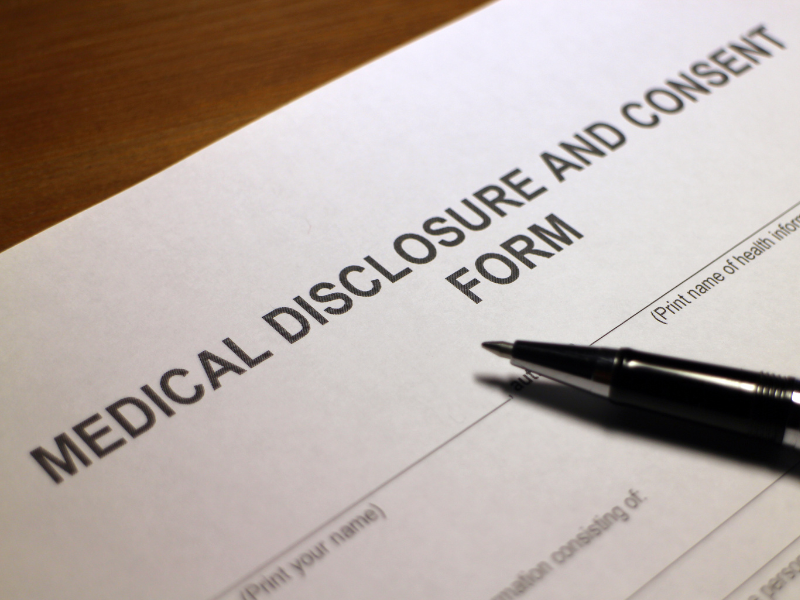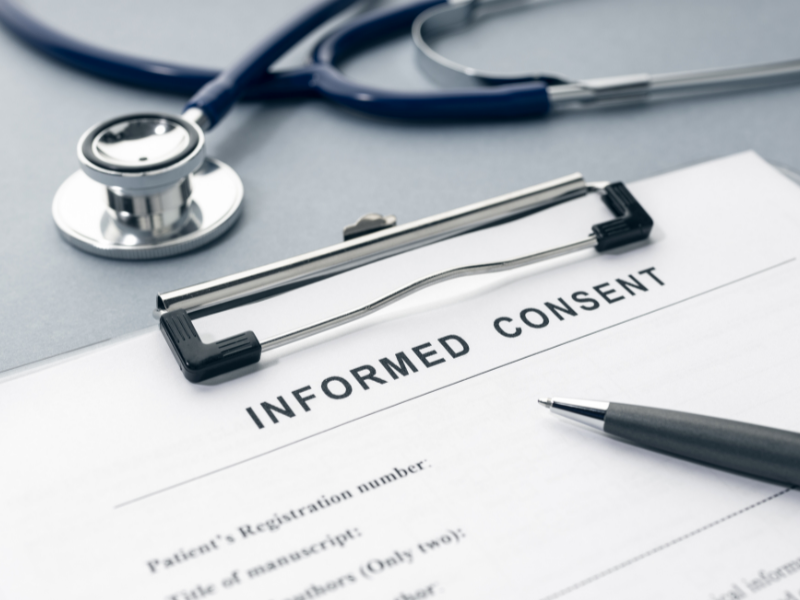Protecting a patient’s health information is crucial in the medical and healthcare industry. Because of this, federal laws like the Health Insurance Portability and Accountability Act (HIPAA) require covered entities to adhere to specific document guidelines.
Take HIPAA forms for patients, for example. These forms allow healthcare professionals to disclose a patient’s health insurance and health data while maintaining compliance with HIPAA.
In this article, you will learn why these forms are necessary for obtaining patient consent.
Table of Contents

What Are HIPAA Forms for Patients?
HIPAA forms, also known as privacy or consent forms, are legal documents that patients must complete and sign in various healthcare settings. These forms also serve as written acknowledgments and authorization forms, allowing healthcare providers to collect, use, and disclose a patient’s protected health information (PHI) in accordance with HIPAA regulations.
The purpose of HIPAA forms
The primary purpose of HIPAA forms for patients is for healthcare providers to inform patients about their rights and give consent for sharing health information while restricting unauthorized disclosure.
HIPAA forms give patients the right to access their medical records, which includes the following benefits:
- Protecting the privacy of patients and restricting PHI disclosure to unauthorized individuals or entities.
- Giving patients the ability to make informed consent about the use and disclosure of their medical information.
- Streamlining communication among professionals from various specialties (i.e., multidisciplinary or interdisciplinary care).
Commonly Used HIPAA Forms
There are several common but essential HIPAA forms for patients, including:
- HIPAA authorization forms: These forms grant healthcare providers permission to disclose PHI for specific purposes not covered under routine treatment, payment, or healthcare operations. Examples include sharing medical information with family members or participating in research studies.
- Notice of privacy practices (NPP): The NPP is a document that outlines patients’ rights regarding their PHI and describes how healthcare providers may use and disclose this information. Patients are typically provided with a copy of the NPP when they first seek treatment or upon request.
- Request for access to medical records: This form allows patients to request copies of their medical records. Patients have the right to review and obtain a copy of their PHI held by healthcare providers.
- Request for amendment of medical records: Patients can use this form to request changes or corrections to their medical records if they believe the information is inaccurate or incomplete.
- Request for accounting of disclosure: This form allows individuals to obtain information about the instances when their PHI has been shared or disclosed.

Notice of Privacy Practices (NPP)
The NPP is a fundamental component of HIPAA compliance. It informs patients about their rights regarding their PHI, including how their information may be used, disclosed, and protected. This particular notice also specifies that aside from requesting access, patients can also request amendments and file complaints against anyone found violating their rights to privacy.
Importance of the NPP
The NPP is crucial as it empowers patients with knowledge and awareness of their rights regarding their PHI. It helps patients make informed decisions about their healthcare and provides them with the confidence that their medical information will be handled securely and confidentially.
5 components of an effective NPP
An effective NPP should include the following components:
- Use clear and concise language that is easy for patients to understand.
- A description of patients’ rights regarding their PHI.
- An explanation of how healthcare providers may use and disclose PHI.
- Information about the provider’s responsibilities in safeguarding PHI.
- Contact information for patients to address concerns or file complaints.
Patient Authorization Forms
Patient authorization forms are used when patients need to consent to share their PHI for specific purposes beyond regular healthcare activities. Such purposes include research studies, legal proceedings, or insurance claims. These forms ensure that patients have control over their information and can make informed decisions about its release.
When authorization is required
Authorization is required when PHI needs to be shared for purposes such as marketing, research, or communicating with family members. In these cases, patients must sign an authorization form explicitly stating the purpose of the disclosure and the information to be released.
6 components of a valid authorization form
A valid authorization form should include the following elements:
- Patient’s full name and contact information.
- Description of the information to be disclosed.
- Purpose of the disclosure.
- Name of the person or entity authorized to disclose the information.
- Expiration date or event upon which the authorization becomes invalid.
- Patient’s signature and the date of signing.
Request for access to medical records
Under HIPAA, patients can access their medical records and PHI unless an exception applies. For example, they can submit a request to healthcare providers to review or obtain copies of their laboratory and diagnostic results.
With easy access to medical information, patients can stay up-to-date with their medical history, make informed healthcare decisions, and even seek a second opinion.
The process for requesting medical records
To request medical records, patients need to submit a written request to the healthcare provider or facility. The request should include the patient’s name, contact information, and specific details about the information requested. Providers must respond to the request within a reasonable timeframe.
Request for amendment of medical records
Patients who believe their medical records contain errors or incomplete information can request amendments. This ensures that their records accurately reflect their medical history.
Patients have the right to request amendments to their medical records if they believe the information is incorrect or incomplete. Healthcare providers must review these requests and make appropriate corrections or provide a written explanation for the denial.
The process for requesting amendments
To request amendments, patients need to submit a written request detailing the changes or corrections they wish to make. Providers must respond to the request within a specific timeframe and either make the requested amendments or provide a written explanation for the denial.
What Happens After a Patient Signs a HIPAA Form?
Once patients sign HIPAA forms, healthcare providers are legally bound to protect the privacy and confidentiality of their PHI. This commitment requires providers to implement strong security measures to prevent unauthorized access, use, or disclosure of the patient’s information.
By adhering to these regulations, healthcare providers demonstrate their dedication to protecting patient privacy, earning their trust, and ensuring that medical records are handled with the utmost care and shared only when necessary and permitted under HIPAA guidelines.
Ensure Confidentiality With HIPAA Forms For Patients
HIPAA forms safeguard patient privacy in healthcare. Understanding their purpose empowers active participation in decision-making and protects sensitive medical information. These forms promote privacy, trust, and transparency in healthcare. Access digital or printable HIPAA forms for patients to exercise rights and control what happens to health information.








